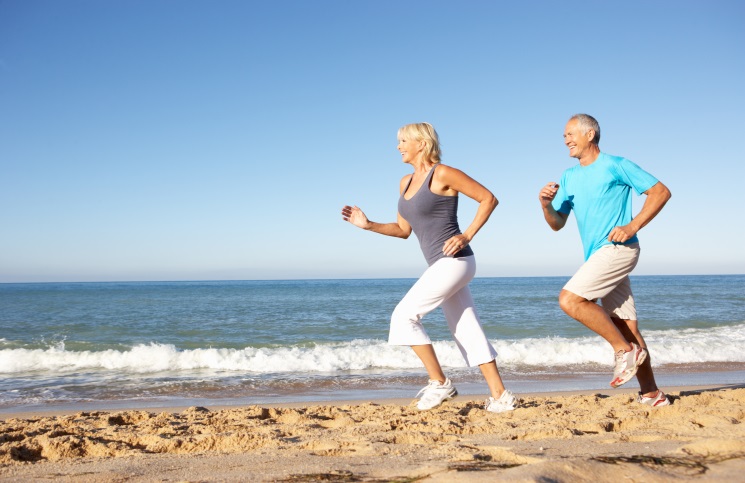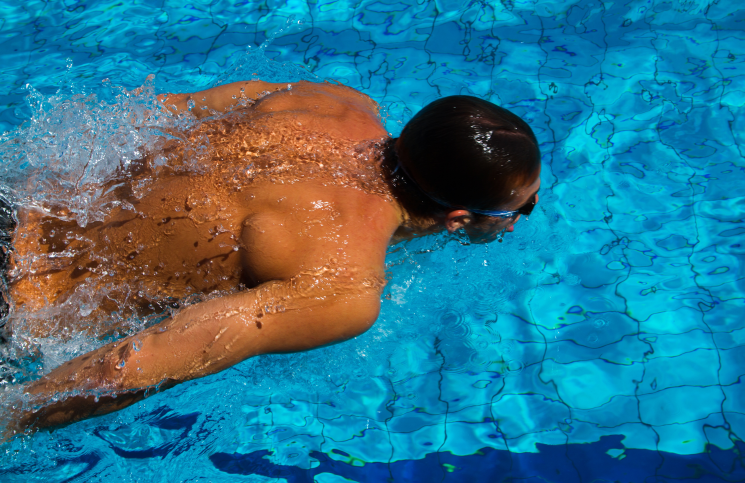Along with diet, exercise is truly the easiest way to ensure you have a healthy, happy and productive life during your time here on this planet.
In the following, you’ll gain some in-depth knowledge about the far-reaching benefits to your health that regular exercise offers: weight management, cardiovascular, immune system, sex life, and sleep quality.
1. Weight Management
The connection between eating too many calories and excess body fat cannot be disputed. Calories in, calories out. However, just a few hours of moderate to intense exercise each and every week can have a profound effect on body composition.
The body continues to burn fat as fuel long after a workout ends, particularly if you get your pulse up to 60% or higher of your maximum heart rate, also known as the “fat burning zone,” for at least 20 minutes. Increased metabolic activity and fat burning continues in the body for up to 24 hours after an intense workout. Find your target heart rate on Heart.org.
2. Cardiovascular Health
The positive effects that exercise has on the heart are vast, and often misunderstood by most people. Yes, the heart is indeed a muscle and physical movement forces our most important muscle to get stronger in order to pump more blood to our muscles, ligaments and organs more efficiently, in order to feed them the oxygen and glucose they need to sustain life, and to flush dangerous lactic acid (the byproduct of exercise) out of the muscles so they don’t cramp up. Most people understand this process.
However, the heart gets further long term benefits from exercise by lowering blood lipids. Both cholesterol and triglyceride levels increase when we don’t get enough exercise. When cholesterol and triglyceride levels get too high in the blood, they oxidize and stick to the walls of our arteries, causing arteriosclerosis and eventually high blood pressure which can lead to heart attack.
Increasing metabolic activity through exercise helps control all the variables that contribute to heart disease including hormone control, lipid levels, cholesterol and glucose handling (ie., blood sugar levels.) Learn more.
3. Immune System
Few people actually understand the effect exercise has on our immune system. We’ve all heard that people who exercise tend to get fewer colds, flus and other common ailments. And that people who get more exercise live longer than those who don’t. However, you might be interested to learn that the immuno-boosting benefits we get from exercise come mostly from moving toxins out of our lymphatic system.
Our lymph system has a dual purpose in the body. This system of cellular vessels and lymph fluid carries antioxidants to every cell in our body. Antioxidants are essential for immune function: stopping dangerous oxidation which leads to disease and speeds up the aging process in every cell in our body. The lymph fluid then carries cellular waste and toxic materials out of the cells and into the kidneys and liver for disposal through the urinary tract and bowels.
The good news with regard to the lymphatic system and exercise is that you don’t need much movement to keep this system working freely and efficiently (see these easy lymph- circulating exercises.)
4. Sex Life
While regular sex is essential for our emotional well-being, regular exercise is crucial for the health of our reproductive system Poor circulation due to high cholesterol, lipid, and blood sugar levels all lead to decreased blood flow to our sexual organs. People who exercise very little tend to have low levels of serotonin and high levels of the stress hormone, cortisol – two main conditions that contribute to a lack of sexual desire in men and women.
A simple low-impact 20 minute walk every day will help burn away excess cortisol from stressful work days, and cause the brain to release serotonin which causes lack of sexual desire in both sexes. All in addition to the long term benefits to our circulatory system health; the #1 reason for decreased sexual performance in men.
5. Sleep Quality
Sleep and exercise are two of the foundational elements of good health. Eat poorly and you’ll have trouble sleeping. Don’t exercise and the same thing happens. A person who doesn’t exercise very much, or at all, will still be able to sleep as long as someone who doesn’t – perhaps sleeping longer even – but the level of sleep quality among people who move around on a regular basis is profoundly different.
There are three phases the body passes through when we sleep:
1. Slow Wave
2. Rapid Eye Movement (REM)
3. N2
It’s thought that most of our healing comes from slow wave sleep, which constitutes a third of our sleep time. REM sleep is where most of our dreams occur and is supposed to be short duration. N2 makes up most of the time we sleep and is thought to be the time when the brain and body are truly most relaxed.
People who don’t get very much exercise have been found to spend way too much time lingering in the REM state, leaving less time for the body and brain to both heal and rest. Studies have proved conclusively that exercise decreases time spent in REM, thus increasing the time spent in the healing and relaxing slow wave and N2 states (source).
Recommendations
Most sources recommend we exercise at least three times a week for twenty minutes or more. While it’s true that such a routine is better than nothing, everyone should strive to get at least a half-hour of exercise for a minimum of five days per week – every day would be even better!
A simple walk is all that’s required to constitute a workout. If you’re doing more intense exercises like jogging, cycling, or lifting weights, definitely make sure you get at least two days of rest from those kinds of routines throughout the week to avoid chronic fatigue syndrome; a condition with a host of negative side effects to your health (source).




